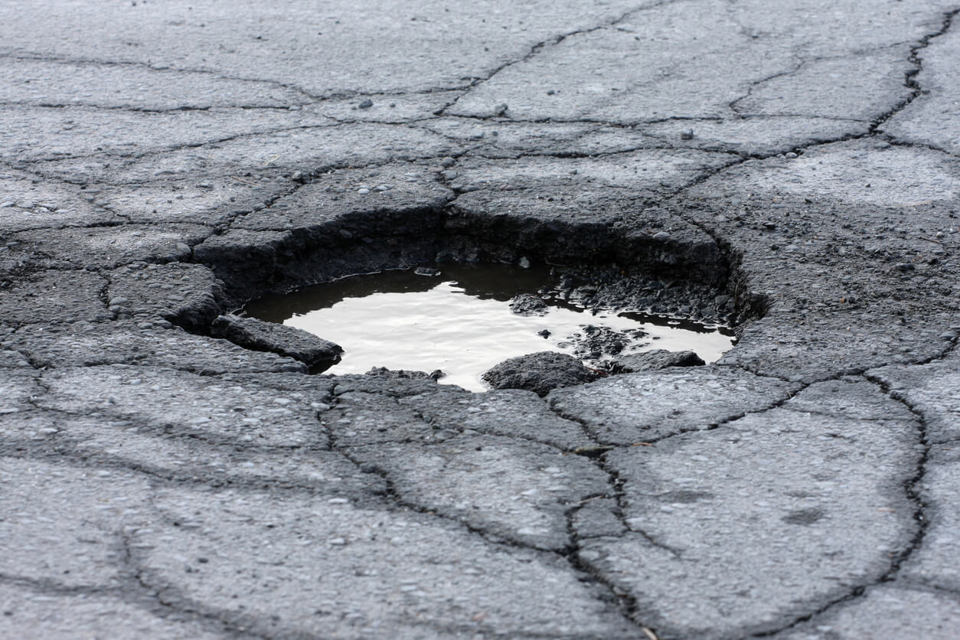The desperate state of the country’s local roads has been revealed in a new survey from the RAC.
More than half (56%) of drivers surveyed for the RAC Report on Motoring say the condition and maintenance of roads for which councils are responsible was one of their top motoring concerns.
This was up seven percentage points compared to 2023 (49%) and 21 percentage points ahead of their next biggest concern, the cost of insurance.
The survey also revealed that more than a quarter of drivers (27%) say their vehicle has suffered damage as a result of potholes in the past 12 months, a figure which rises to 32% among those who live in rural areas.
Punctures (47%) are the most common problem reported, followed by wheel damage (43%) and broken suspension springs (29%).
The latter two problems can be particularly expensive, with RAC data showing that the average cost of repairing a family car costing anything up to £460.
Separate RAC breakdown data shows that patrols went out to 25,085 pothole-related breakdowns in the 12 months to the end of June.
Since the start of 2020, the total number of breakdowns most likely to be caused by potholes stands at 167,000.
The report finds that a record proportion of drivers are reporting that local roads they use are in a worse state than the 12 months before.
This year, almost three-quarters (73%) of drivers say the condition of the local roads they use regularly is poorer than a year ago, compared to 67% last year and just 49% who said the same thing in 2019.
Just 6% of drivers believe local road surfaces have improved this year compared to last, a statistic that underlines the desperate state many councils now find themselves in when it comes to looking after some of their most vital assets.
RAC head of policy Simon Williams said: “These new figures are a damning condemnation of the commitments made by previous governments to fix Britain’s perpetual pothole plague.
“It’s as clear as day that councils simply haven’t had the financial support they need to bring the standard of the roads in their care up to a reasonable standard.”
The RAC’s figures show that the problem of substandard local roads is more acute in rural areas, where 81% of drivers say conditions are worse in 2024 than in 2023, and in suburban locations where the proportion is only slightly lower at 78%. Both figures are record highs.
In towns and cities, a majority of respondents – 53% – believe the condition of local roads they regularly drive on is worse than a year earlier.
Across the UK, the greatest proportions of drivers who report the condition of local roads as being bad are those in the East Midlands (85%), the south-east of England (83%) and the south west (79%).
Even in London, where as many as 18% of respondents said they believed their local roads had improved during the previous 12 months, half (50%) still said the opposite.
Williams continued: “Whatever promises about road maintenance funding that have been made in the past – whether that’s through things like the Pothole Action Fund or so-called ‘Challenge’ funds, where councils were asked to bid for extra cash – haven’t delivered.
“At best, journeys are made downright uncomfortable as a result of potholes, while at worst they cause expensive damage or even represent a danger to life and limb.”
The RAC has written to the Department for Transport (DfT) calling for urgent clarification of the funding councils will receive for road maintenance.
But it also advises that the problems with the UK’s local roads are more complex than simply a lack of money, a point most recently made in the National Audit Office’s report published on 23 July.
This uncovered multiple issues, including the way that road maintenance funding is allocated to councils and the fact government does not have an accurate picture of the true state of roads in council control.
“The new Government simply must do something differently,” said Williams. “Without a promise of far more funds for councils – something we will push hard for ahead of the autumn Budget – its options are extremely limited.
“Put bluntly, the less we spend as a nation on our roads now, the more it will cost us in the future. That’s the pattern we’ve been in for years now, as is clearly shown by data from ourselves and from many other parts of the industry. So, the ultimate question is this – in terms of the inevitable costs we’ll face in the future, can we really afford not to fix our dilapidated roads?
“Drivers, who contribute billions to the Exchequer in taxes every year, have been driven to despair by a local road network that, in far too many parts of the country, is just going from bad to worse.
“It shouldn’t be this way. They need something to believe in from both national and local government. Anything less than a step change in the condition of the roads over the course of this Parliament simply will not do.”





















Login to comment
Comments
No comments have been made yet.